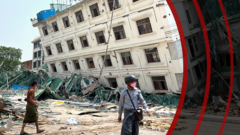### Summary
### Myanmar: Transnational Crime Thrives Amidst Chaos

### Myanmar: Transnational Crime Thrives Amidst Chaos
The civil strife in Myanmar has fostered a prolific environment for crime syndicates, turning the nation into a global hub for illicit activities, particularly drug trafficking and cybercrime.
In a startling transformation since the military coup in 2021, Myanmar has emerged as a significant center for organized crime as various syndicates exploit the government's weakening grip on power. The country is now a major player in opium production and has seen a boom in scams and cybercrime, a trend with severe implications for regional stability.
---
The stunning landscapes of Shan State, once known for their natural beauty, now mask a darker reality as they become key territories in the global narcotics trade. With opium cultivation thriving, Myanmar has regained its position as the world’s leading exporter of opiates, supplying the international drug market. This agricultural practice, long tied to the conflict and impoverishment of rural communities, has only intensified since the February 2021 coup.
The turmoil following the overthrow of Aung San Suu Kyi’s government has created a vacuum filled by various criminal organizations. Reports indicate that these syndicates, many linked to powerful factions within Myanmar and neighboring countries, have consolidated their hold over illicit activities such as drug trafficking, human smuggling, and online scams. The Global Organized Crime Index now designates Myanmar as a primary nexus for transnational crime, with repercussions felt across Asia and beyond.
As law enforcement agencies struggle to maintain control amid ongoing violence and lawlessness, the rich resources of this conflict-ridden nation fuel a growing network of crime that poses serious challenges to regional security. The rise of unregulated cyber operations, including online gambling and scam factories, points to an expanding frontier for criminals in Myanmar, leveraging technology to reach victims globally.
Myanmar's journey into chaos serves as a grim reminder of how rapid political changes can enable organized crime to flourish, affecting millions while presenting a conundrum for international authorities. Without a concerted effort to restore stability, the situation is poised to deteriorate further, making Myanmar a persistent focal point for illicit trade and global crime.
---
The stunning landscapes of Shan State, once known for their natural beauty, now mask a darker reality as they become key territories in the global narcotics trade. With opium cultivation thriving, Myanmar has regained its position as the world’s leading exporter of opiates, supplying the international drug market. This agricultural practice, long tied to the conflict and impoverishment of rural communities, has only intensified since the February 2021 coup.
The turmoil following the overthrow of Aung San Suu Kyi’s government has created a vacuum filled by various criminal organizations. Reports indicate that these syndicates, many linked to powerful factions within Myanmar and neighboring countries, have consolidated their hold over illicit activities such as drug trafficking, human smuggling, and online scams. The Global Organized Crime Index now designates Myanmar as a primary nexus for transnational crime, with repercussions felt across Asia and beyond.
As law enforcement agencies struggle to maintain control amid ongoing violence and lawlessness, the rich resources of this conflict-ridden nation fuel a growing network of crime that poses serious challenges to regional security. The rise of unregulated cyber operations, including online gambling and scam factories, points to an expanding frontier for criminals in Myanmar, leveraging technology to reach victims globally.
Myanmar's journey into chaos serves as a grim reminder of how rapid political changes can enable organized crime to flourish, affecting millions while presenting a conundrum for international authorities. Without a concerted effort to restore stability, the situation is poised to deteriorate further, making Myanmar a persistent focal point for illicit trade and global crime.


















